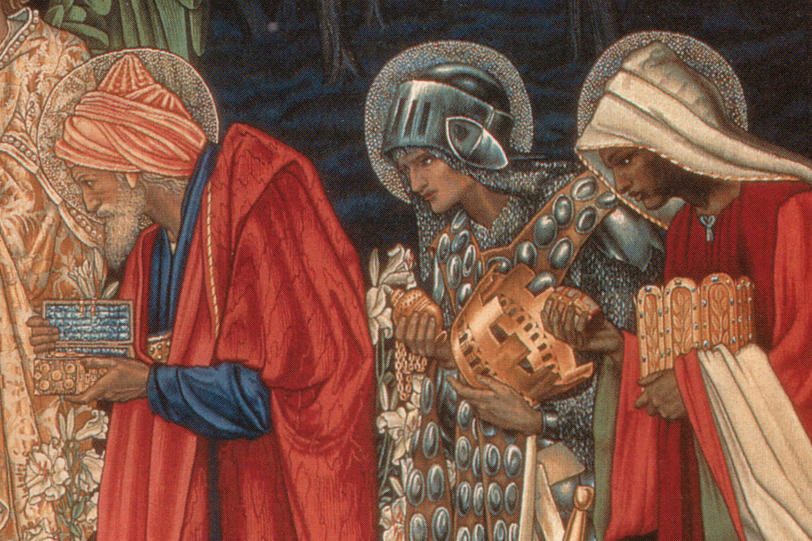 Epiphany?
Epiphany?
January 6 is “Epiphany” wherever you may be, but the celebration has a different emphasis in the West than the East.
The word itself means “appearance” or “manifestation.” In the Western Church year it is about the appearance, or manifestation of Christ to the non-Jewish nations of the world. That’s you and me, Bub.
He was a Jew, and came first to the Jews — so let all anti-Semites take pause — but even in infancy God was making it clear that he was to be savior of all.
In Orthodoxy it is a much bigger celebration, a serious rival to Christmas. The focus there is on the Baptism of Christ by John. But that’s a matter for another day.
In the West Epiphany gets far too little attention. If January 6 doesn’t happen to fall on a Sunday, most Protestants will not notice it slipping by.
After all, in year C last Sunday Jesus was 12 years old in the Temple. So why are we turning back the clock to Matthew 2:1-12, the coming of the “Magi from the East?”
Matthew 2:1-12
I do prefer to stick with calling them by the term used in the Greek: they are “Magi.” It’s a mysterious sort of title.
- They are not specifically stated to be men, or even wise, though they certainly were the latter.
- They are not stated to be either three, or kings, as the old carol and much lore would tell us.
But they did come from “the East,” from a faraway country. They were not Jews. They did not seek the newborn King of the Jews because the biblical prophets had told them to.
No, they came because they had inquiring minds. They sought the truth, and the meaning of things, using the science and insight of their own culture.
And they found Jesus.
What was that?
Though they were not the People of the Covenant, they found Jesus.
And they worshiped him.
Once their own knowledge led them to the Truth, they bowed down, worshipped, and gave gifts.
The wrong people came, they came the wrong way, and God welcomed them.
And it seems quite reasonable to say that the resources these Magi gave the Holy Family, the gold frankincense and myrrh, made it possible for the infant Jesus to survive his refugee flight to Egypt and return to be your savior.
So you owe your salvation to a roving band of godless foreigners.
Generous foreigners who helped refugees.
Apolytikion of the Feast
The Orthodox sing of the coming of the Magi all through Advent. Though for them it is not an Epiphany hymn, this short piece (from the amazing Digital Chant Stand of the Ages Initiative) captures what I think is most important in the Western celebration:
Your nativity, O Christ our God,
has caused the light of knowledge
to rise upon the world.
For therein the worshippers of the stars
were by a star instructed to worship You,
the Sun of Righteousness,
and to know You as Orient from on high.
Glory to You, O Lord.
I could say more, but I’m under the weather and want instead to get this out to you with the following five Epiphany observations as we move into a new year as God’s people on this troubled globe.
- The wrong people can find Jesus.
- The wrong knowledge can lead them to Jesus.
- People from the wrong places may well belong to Jesus, now, or in the future, unawares.
- What you do to the least, you do to Jesus.
- And that refugee on the news faces circumstances much like those Jesus faced.
++++++++++++
I’d love to send all my Monday Mediations (as well as my other new articles and announcements) straight to your inbox. Just scroll down to the black box with the orange button to subscribe and all this will be yours…

There’s some really interesting scholarship happening right now that’s exploring how the scripture was formed. They’re finally moving away from the idea of “J” and “P” in Old Testament scholarship and “Q” in New Testament scholarship (thank goodness!). This new approach is largely called hypertexuality and it’s fascinating.
At any rate, a Polish professor, Fr. Bartosz Adamczewski, demonstrates that the magi are symbols of Arabia, the location of Mt. Sinai where the Law (Torah) was given to the Hebrews. Adamczewski bases this understanding on the gifts they brought: gold, frankincense, and myrrh, which all come from the region of Arabia (Herodotus, Hist. 3.107). By combing Arabia (Mt. Sinai) with the magi, Matthew is able to recall the Exodus story, the story about how God revealed himself and formed Israel from a bunch of Hebrew slaves. Now, he’s using the foreign magi to show that he’s (re)forming his people in a way that includes all the nations/Gentiles.
For Adamczewski, the star is a reworked version of the fire and pillar of cloud that led the Israelites through the wilderness after receiving the Law on Sinai. In short, Matthew has reworked the story of God caring for the Hebrews in the wilderness. Now God leads the foreign magi to a “promise.” This explanation explains why the star seems to move and why it “stops” when it reaches Bethlehem (Christ now being the new Joshua, which is also the name Jesus, who leads us into the “ultimate” Promised Land).
Source: “Hypertexuality and Historicity in the Gospels,” by Bartosz Adamczweski, pages 48-53.
Cool! Thank you Fr. Dustin.
Gary – thanks so much for the fascinating post. I’m sorry to say that in the current climate the idea that God welcomes the wrong people might be more than a bit controversial.
Fr. Dustin – Thanks for sharing scholarship regarding the Epiphany story. That really adds a new, rich dimension to the story. Lots of good stuff there to think about.
Thanks Gary. Probably controversial on the year AD 0 as well.
Gary P., I’m glad you enjoyed it!